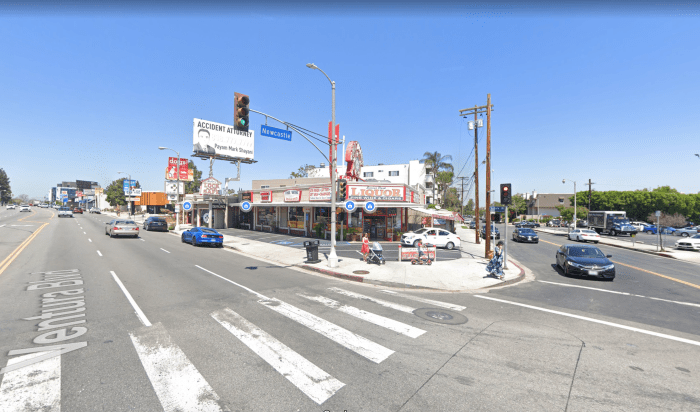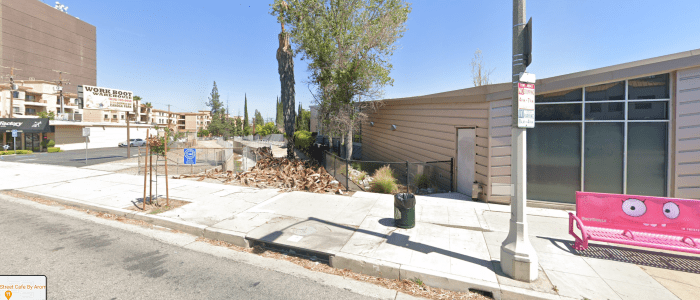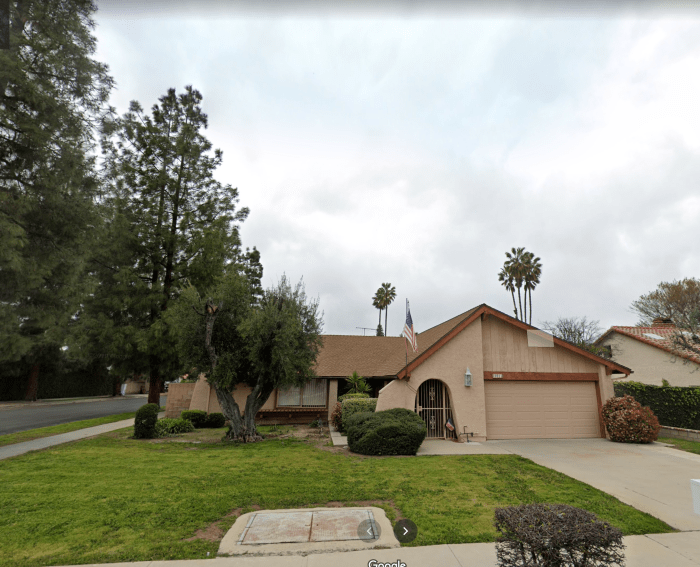Yesterday, Sunday, there were no evident calamities around us. Tragedy took a day off. The air was clear from fire smoke, some blue showed in the sky, and we went for an air-cooled drive around our San Fernando Valley behind tinted windows and masked faces.
We passed Woodley Park, once a bird sanctuary, now just a burned-out bunch of fields with blackened pieces of wood and broken fences, shopping carts of trash and an air of war, desolation and defeat.
There was the farm stand at Tapia Brothers and we stopped to buy tomatoes, Anaheim peppers, carrots and peaches, standing six feet away from other masked shoppers. Pulling out of the dusty lot there were two choices: drive somewhere else or go home. We chose the former.
We went for a drive west along Ventura Boulevard through Encino and Tarzana, past those billboarded and plastic signed points of shlock and tackiness beloved by many, demoralizing in a good year, demoralizing in a bad one.
At Newcastle, groups of Jews in masks, yarmulkes, and tallit, walked with prayer books, dressed in their Rosh Hashana suits and dresses. A mentally ill Black man, without a shirt, danced obliviously in front of the liquor store as the faithful passed by him pushing baby carriages, on their walk home.
Further west, a homeless woman emerged from a tent parked along a concrete channel behind the prow shaped Encino/Tarzana library, temporarily closed. A blue sign hung along the fence on Ventura, “NO DUMPING: This Drains to Ocean.”
We drove all the way to Shoup Avenue in Woodland Hills, a district of Los Angeles where people once moved to get away from everything bad in the city. Under the 101, dozens of men and women were set up in a trash camp, living under tarps, in tents, the public sidewalk their front lawn.
At Woodland Hills Park, where Uncle Paul, Aunt Frances, Cousins Barry, Helene, Julie, Jason, Delaney and Courtney, spent many days of the past half century in the world of juvenile baseball and softball, homeless RVs parked. I wonder what flowered apron and blue rubber gloved Aunt Frances, who died in 2012, would say. She kept a spotless house, even telling me she would not eat dark raisins because they reminded her of little bugs.
“Oh, Andy you’re so funny,” she would often say.
We turned down Erwin Street just to look at the corner ranch Aunt Frances and Uncle Paul bought for $63,000 in 1973. Uncle Paul is 99, a widower, still living there. The stucco is faded pink, there are bars on the windows, and Zillow estimates the house could fetch close to a million. Property taxes are about $800 a year, eternally fixed at the purchase price, a good deal for the retired soldier who fought at Iwo Jima and Leyte Island.
We didn’t go in but I thought of the inside I first saw in July 1974.
The Barcalounger, the brown carpet, the brown paneling, the yellow wallpaper, the cottage cheese ceilings, the dining room with the glass shelved cabinets full of Lladros and ceramic poodles and carved children with fishing poles, a room nobody ate in; the other dark rooms with the Roman shades or pleated drapes always pulled down against the sun, the bathrooms with wall-to-wall carpeting and mylar wallpaper, the rooms full of family photographs, the 1,762 square feet of living space without one book; the air-conditioning that ran year round, and the garage housing the Buick LeSabre, full of power tools and Leslie Pool Equipment, the refrigerator packed with Costco frozen foods, bottles of cold water and diet sodas, the TV always on for baseball and Fox News, these are the moments one cannot easily forget.
Then we turned around and drove east along Victory Blvd. passing the empty weed infested parking lot at temporarily closed Pierce College. We drove down Winnetka to get to the 101 and again passed another encampment under the freeway, more men and women living outdoors without housing in Los Angeles.
When I go out these days, leave my house for a drive, I am in another nation, not my own, a scarred and withered place of broken people, angry and exhausted, in a city unclean and unjust. And ominously, seemingly, frightfully just about ready for a violent revolution.




“a room nobody ate in”
“the garage housing the Buick LeSabre, full of power tools and Leslie Pool Equipment”
I just got flashbacks to my Aunt Angie and Uncle Knobby’s house in Canoga Park. A little beige stucco box with a tiny kidney shaped pool in the back. A stunted citrus tree I though were lemons, but were really failed grapefruit. The blue shag carpet and matching linoleum. They bought it for peanuts on the GI Bill right after the war. Those houses are both nostalgic and sad for me. I don’t want the life that was on offer then, but I don’t want this one either…
LikeLike
The likes of your uncle are the main problem: all they can see is that they got theirs, and screw-everybody-else, and that the “rabble” needs to be managed with gates and shotguns, and vote relentlessly for reaganist politicians. Their mindset is similar to this one:
A very wealthy resident of San Francisco similarly complained a few years ago:
“The residents of this amazing city no longer feel safe. I know people are frustrated about gentrification happening in the city, but the reality is, we live in a free market society. The wealthy working people have earned their right to live in the city. They went out, got an education, work hard, and earned it. I shouldn’t have to worry about being accosted. I shouldn’t have to see the pain, struggle, and despair of homeless people to and from my way to work every day.”
https://dilbert.com/strip/1989-04-18
LikeLike
“The wealthy people have earned their right.”
As have the ones with six generations before them leaving behind money, property, connections, etc.
LikeLike
As always, I find your observations a catch-22 of beautifully haunting renditions of multi-tiered rot. The layers of extreme yin/yang we are surrounded (entrapped?) by, the chasm between haves, have-nots, and the you and me as everyperson, out for a Sunday cruise.
I can relate with the fading colors, indelible memories of not-always-pleasant things, wondering ‘Why? Why? Why?’ in between the squeak of the baby stroller and the flap of a tarpaulin draping someone’s makeshift home.
(I’ll add that I don’t think increased firepower is going to mend this tapestry. The hole blasted in what was once a reachable Great American Dream — and the subjectivity of that dream defined multiculturalism — is a lot bigger than a grapefruit).
Peace, strength, vote.
LikeLike
Thank you Paul. I really appreciate your comment.
LikeLike
“NO DUMPING: This Drains to Ocean.”
This dissuades who, exactly? The conscientious would never think of dumping in the first place. And the message is lost on the less-conscientious with the 5 quarts of used motor oil, regardless the cute little blue dolphin. Another Prop-65 warning that goes unheeded and little noticed but by the most observant.
LikeLiked by 1 person
We have many laws and signs and few who obey them.
LikeLike
It’s none of my business, but do you own a firearm? If not I recommend you purchases one. Things are gonna get a lot nastier before they get better, and you and your significant other ought to be prepared for any and all eventualities. There’s a decent gun shop out in Reseda . It’s called Turners. I would recommend a shotgun. Something that makes a lot of noise and you don’t have to be a marksman to shoot. A Remington 870 12-gauge should do the trick.
I don’t live in the Valley anymore, Andy. I met my wife in Israel back in 85′ when we were both serving in the IDF. Miki was of course native born, I was a new immigrant. We spent 20 years living in the Valley, I owned both a business and a home in Van Nuys. My son, Gideon, is 14 and on the spectrum, but high functioning. We returned to Israel last year when we realised that our son, who is a very smart boy, was being failed by the school system, couldn’t afford to go private, and we could read the writing on the wall as the country and the city began to lose social cohesion. When I immigrated to Israel, I was 19 years old, running away from a shitty life. I never dreamed that getting that second passport and citizenship would be the smartest thing that I would ever do in this life. We now live in a place called Raanana. Raanana is what you’re always talking about. 1950’s, 60’s, and 70’s America. A place where your kid walks to school, where shopping, my doctor, etc is in walking distance, beautiful parks everywhere… Good luck, and stay safe..
LikeLike
Well when the craziness gets crazier how is one firearm going to stop the mob?
LikeLike
With respect, you’re dealing with a generation of cos players, stolen valour enthusiasts, and students of modern pharmacology. Yep. It’s all fun and games until someone’s about to have a hole blown into them the size of a grapefruit. Most, if not all, will run away as soon as they hear the sound of a pump-action shotgun being locked and loaded. Besides, what are your choices? The cops showing up only after you and your family are dead or running away and abandoning your home and everything you’ve worked for in the face of this rabble… But whatever you do, I wish you well..
LikeLike